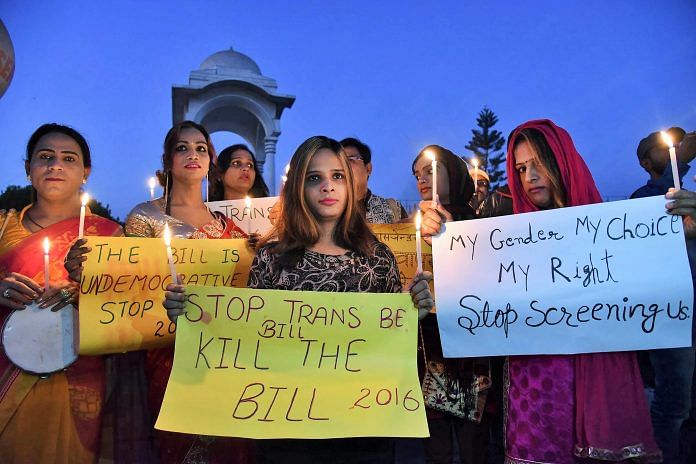The Trans Bill defines transgender people in a way that is so insulting and derogatory that it is beyond belief.
Chitte, 25, is part of a hijra community that lives in Warangal. Every morning, she and her family members go out and beg for a living. But now they fear that very soon, as a result of the Trans Bill that the government of India wishes to pass, not only will they be forced to give up their livelihood, but that their very way of life will be criminalised.
Chitte and her family have come to Delhi, at a great personal cost to themselves — for every day away is another day that they don’t earn — to oppose the bill, likely to be tabled in the current winter session of Parliament.
Anush, a 35-year-old trans man from Kolkata, doesn’t see himself or his community reflected in the bill’s ambit at all.
“There are many problems with the bill — it should address the rights of transgender and intersex people. Instead, it assumes that all intersex people are trans, which is inaccurate, and also further invisibilises trans men.”
This is the disturbing culmination of a process that started on a high note. In 2014, the Supreme Court passed a progressive judgment that recognised the fundamental human rights of trans people under the Indian Constitution. It issued broad directives that were meant to ensure the community’s welfare, including provisions for protection against violence and discrimination, and basic services such as reservations, employment, and education.
This was rightly counted as a huge victory. However, each successive year since then has only brought great dismay. Not only have trans rights not improved, the government has, in fact, set them back by at least 50 years, some say.
There have been several versions of the bill, and each successive version has taken it further and further away from the spirit and nuance of the Supreme Court judgment (colloquially called the NALSA judgment). The version of the bill that was the strongest and most accepted by trans collectives from all over the country was introduced by M.P. Tiruchi Siva in 2014, and passed unanimously in the Rajya Sabha. It is still pending in the Lok Sabha.
In the meantime, the government’s 2016 bill is nothing short of disastrous.
Trans activist Akkai Padmashali asked a powerful question in the aftermath of the NALSA judgment in 2016 that went something like this: The government doesn’t even know who transgender people are; how could it create a law for a community it didn’t bother getting to know at all?
Her words have proven to be chillingly prophetic. The government’s bill defines trans people in a way that is so insulting and derogatory that it is beyond belief.
Instead of questioning or transcending the gender binary, and embracing the right to the self-determination of one’s gender identity, as the NALSA judgement clearly states, the bill defines trans people as ‘neither wholly male nor female’ or ‘a combination of female and male’ or ‘neither female nor male’. Transgender is an umbrella term that encompasses many different identities, and this kind of reductionist definition doesn’t apply to any of them.
Further, the bill introduces ‘district screening committees’ that will determine whether a person is trans. As a number of activists have pointed out in response, cisgender people do not have to go through such a humiliating gatekeeping process to have their gender identity affirmed. Then why should trans people?
The bill also gives the trans person’s natal family too much power. Often, these spaces are sites of great violence for trans people. They would rather live with communities who embrace and accept them for who they are. If passed, the bill will actually criminalise such communities – or what the group Sampoorna India calls people’s ‘chosen families’.
TG Bill 2016 Factsheet: Bill Provisions & Community Demands
It also criminalises begging without ensuring any affirmative action that will provide basic education and employment to trans people. The provisions for healthcare, too, are inadequate and do not, for example, provide for comprehensive and free/low-cost healthcare, or separate wards in hospitals.
There have been some reports in the media that the government has accepted some of the recommendations that a parliamentary standing committee had made (these had earlier been rejected by the government en masse). But even if this is true — which we don’t know yet for sure, since the government has not yet made an official statement about this — it doesn’t go far enough.
As citizens of a democracy, we should be appalled at what the government has done with a historic court judgment. We must stand with the trans people who are struggling on a daily basis to live a life of dignity, free from violence and discrimination. It is because our laws are exclusionary that when a trans woman from Pune was violently sexually assaulted, her attackers walked free.
Tokenistic progress means nothing. The strongest court judgments and the greatest words of support come to nothing if they are not implemented. It is a matter of shame that trans and gender non-conforming citizens continue to struggle even though their fundamental rights have been affirmed by the highest court in the land.
A giant placard at the New Delhi protest last week said: “It is time to end gender apartheid in India now”. The place to start is the dismantling of the Trans Bill 2016.
Shreya Ila Anasuya is a writer, journalist and the Managing Editor of Skin Stories at Point of View. She tweets at @shreyilaanasuya



